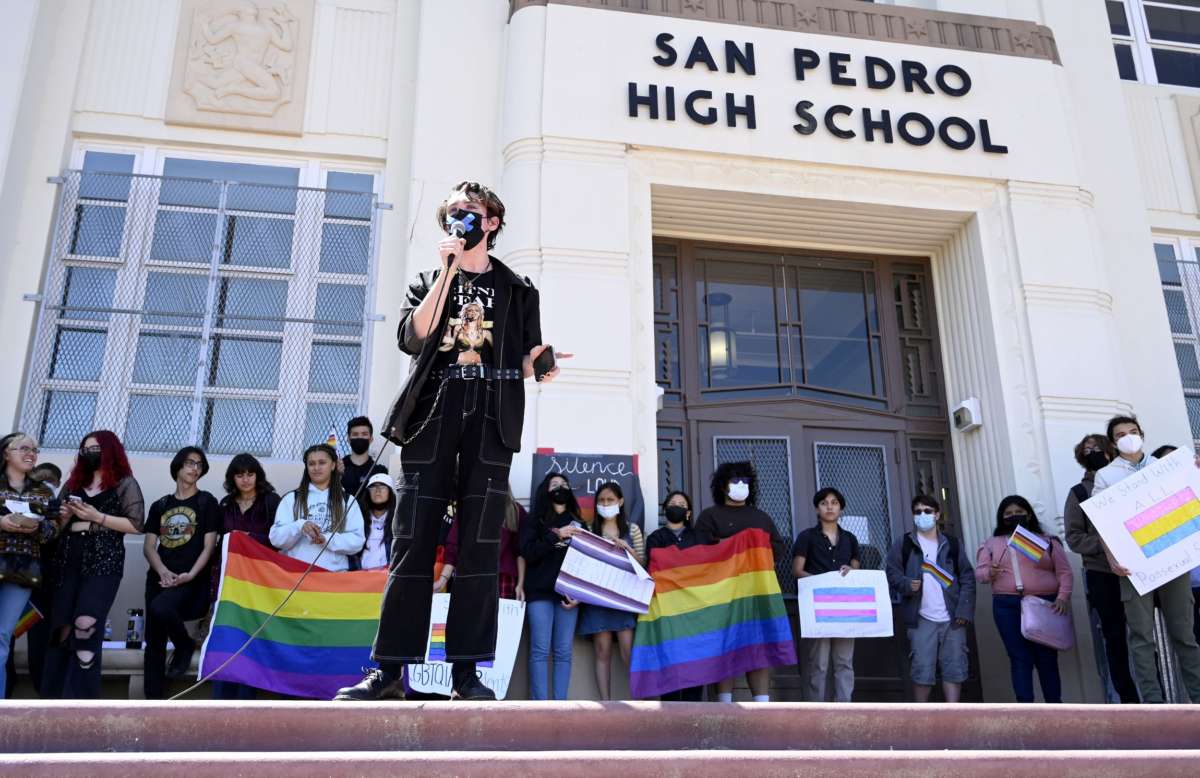Did you know that Truthout is a nonprofit and independently funded by readers like you? If you value what we do, please support our work with a donation.
Republicans have been attacking schools that teach the history of racism in the U.S. and provide inclusive environments for LGBTQ students, hoping to capitalize on a tactic that worked in one noteworthy election last year — but a new report suggests that these efforts may ultimately backfire for the party.
Researchers and pollsters talking to Politico about GOP candidates running in the 2022 midterms said that campaign promises to restrict discussion of racial or LGBTQ issues in classrooms energize Republicans’ base, but push away centrist voters who view their attacks as being too hard on children.
“Their hypothesis was that it would be a swing issue, particularly for suburban voters and parents, and not just a base issue,” Celinda Lake, a Democratic pollster, told the publication. “The way they’ve overplayed their hand is that it’s just a base issue, and in fact alienates some of the suburban voters — particularly suburban parents.”
“The far-right MAGA strategy of using kids and schools as culture war pawns has failed and continues to fail to win converts,” a report from Democratic polling GBAO firm stated last month.
Even GOP-aligned analysts are warning against the strategies that many Republican candidates have employed.
“We see more and more Republicans continuing to play to their base instead of trying to expand their audience. What we really find is the voters really are more in the middle,” Paul Bentz, an Arizona-based Republican pollster, told Politico.
Around 90,000 political ads about education have aired in the U.S. since the start of September. Many of the ads promoted by GOP candidates contain bigoted and baseless accusations against Democrats.
An attack ad against Michigan Democratic Gov. Gretchen Whitmer, for example, accuses her of wanting “a drag queen in every classroom indoctrinating our children.” Democratic Gov. Tony Evers of Wisconsin, meanwhile, has been hit with ads accusing him of wanting books in public schools that “shame kids for being white,” a common — but false — talking point from right-wingers who use fearmongering about critical race theory to activate their base.
Last year, when then-GOP candidate for Virginia governor Glenn Youngkin was running for office, he employed a similar strategy against his Democratic opponent, promising to restrict classroom discussions of racism in the state. Following Youngkin’s win, House Minority Leader Kevin McCarthy (R-California) promised that the GOP would be “the party of education.” Instead of developing proposals to increase resources for teachers and students, however, Republicans have been promoting a so-called “parents’ bill of rights” to empower bigoted school district residents to file complaints about public school curriculums.
Over the past year, right-wing parents, politicians and conservative groups across the country have sought to limit curriculum or ban books in school libraries that explore race or LGBTQ themes. Florida, for example, passed a “Don’t Say Gay” bill into law that limits teachers’ ability to talk about LGBTQ subjects. Texas, which has banned more books over the past year than any other state, has also limited how teachers can discuss racism.
Forty-two states in total have introduced bills to restrict public school educators from teaching about the history of racism in the U.S., with 17 states so far enacting a law or state policy doing so.
A recently published report from researchers at the University of Southern California demonstrates that, while right-wing voters support implementing such restrictions in public school classrooms, most Americans oppose these measures.
“Americans overwhelmingly want high school to be a place where students learn about multiple sides of controversial topics, and they are free to access books touching on a variety of controversial content,” the study found.
Fifty-nine percent of adults in the U.S. say they back lesson plans about transgender rights and gender identity, while 63 percent say they support teaching about sexual orientation, the researchers said. Sixty-five percent say gay rights should be taught in schools.
Ninety-four percent back lesson plans about the “contributions of women [and] people of color” in the U.S., while 95 percent agree that the topic of slavery should be taught in schools and 86 percent believe that racial inequality should be discussed in the classroom, the poll found.
A terrifying moment. We appeal for your support.
In the last weeks, we have witnessed an authoritarian assault on communities in Minnesota and across the nation.
The need for truthful, grassroots reporting is urgent at this cataclysmic historical moment. Yet, Trump-aligned billionaires and other allies have taken over many legacy media outlets — the culmination of a decades-long campaign to place control of the narrative into the hands of the political right.
We refuse to let Trump’s blatant propaganda machine go unchecked. Untethered to corporate ownership or advertisers, Truthout remains fearless in our reporting and our determination to use journalism as a tool for justice.
But we need your help just to fund our basic expenses. Over 80 percent of Truthout’s funding comes from small individual donations from our community of readers, and over a third of our total budget is supported by recurring monthly donors.
Truthout’s fundraiser ended last night, and we fell just short of our goal. But your support still matters immensely. Whether you can make a small monthly donation or a larger one-time gift, Truthout only works with your help.
